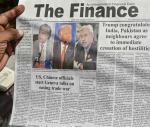You are here
Possible shift of US position on Syria, Iraq still possible
Dec 02,2017 - Last updated at Dec 02,2017
It seems that Moscow had a plan when it intervened militarily in Syria more than two years ago based on a preconceived scenario suggesting that by tilting the military balance in favour of Damascus, it can dictate the terms of the peace formula for the country and secure its naval and air bases in Syria for as long as one can see.
Russian President Vladamir Putin is a masterful geopolitical chess player who must have had a dual vision for his heavy military intervention in Syria: first secure a permanent foothold in the country and second draw up a peace scenario that a weakened opposition cannot refuse.
The Iranian card in the form of military intervention as well on the side of Damascus aided and abetted this Russian master plan. Hence the Sochi tripartite summit between Putin and his Iranian counterpart Hassan Rouhani and Turkish President Recep Tayyip Erdogan had different, albeit complimentary, objectives.
Erdogan's main concern is the Syrian Democratic force in which the Kurdish PYD is the central force. The Turkish president wants no Kurdish military presence along his country's southern border.
Rouhani, meanwhile, wants to cement Iranian presence and hegemony in Syria.
As for Russia, we all know by now what Putin wants in return for his country's investment both militarily and politically in Syria.
This apparent division of the spoils of war in Syria was made possible by the absence of a US presence on the Syrian theatre; or so it seems! Former US president Barack Obama's hands off policy had set the stage for the creation of a power vacuum in Syria that Russia, Iran and Turkey were more than eager to fill.
The missing card in this equation is what President Donald Trump decides to do to refill the vacuum created by Obama. Recent persistent information suggests that the US is not about to turn tail and run away from Syria even at this late hour.
US Secretary of Defence James Mattis has repeatedly said that even the limited US deployment of its forces in Syria, mainly around Raqqa with its huge gas reserves, is projected to increase rather than decrease.
Mattis is no novice when it comes to strategic thinking and if necessary he can override President Trump when push comes to shove on US presence in Syria.
This renovation of the US role in Syria may spoil the gains that Moscow, Tehran and Ankara had planned for all along.
With Beirut, Damascus and Baghdad now allegedly under the grip of Tehran, Washington may feel it is being pushed around too much in the region and belatedly to rectify the situation by seeking to reassert its clout in the area.
I have a hunch that the dreams of Moscow, Tehran and Ankara on Syria could be short-lived if Washington decides that the US presence in Syria and possibly Iraq is a most valued strategic goal.













